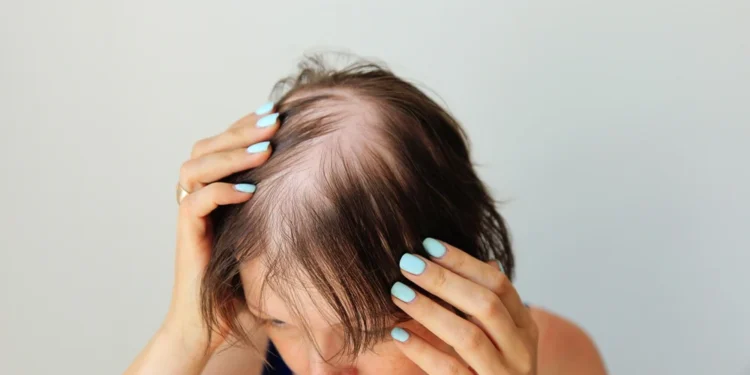Hair loss in women is observed when they shed more than the normal 50 to 100 hairs daily, leading to noticeable thinning, bald patches, or heavy shedding. The condition, known as “alopecia,” occurs when the balance between shedding and hair regrowing is disturbed. Although some individuals think that baldness primarily occurs in men, research has suggested that more than 50% of women suffer from noticeable loss of hair at some point in time or another. Hair loss in women may be permanent or reversible, depending on its cause. It can affect the scalp or other parts of the body, leading to emotional distress and decreased self-confidence. Hormonal imbalance, genetic predisposition, medical diseases, stress, and inadequate nutrition are frequent causes of women’s hair loss.
This blog will explore effective hair loss solutions, including medical treatments, lifestyle changes, and natural remedies to promote hair regrowth. Additionally, it will discuss the best hair loss treatments for women, helping readers understand their options and choose the right approach for their needs.
Table of Contents
Common Causes of Hair Loss in Women
Women lose their hair for various reasons, ranging from fluctuations in food consumption and hormone levels. Some are reversible and short-term, while others require a doctor’s visit. It is crucial to determine why hair is thinning or falling out to make the proper treatment choice. Some of the reasons why women lose their hair are discussed below.
Hormonal imbalances: Pregnancy, PCOS, and menopause cause hair loss.
Stress: Anxiety, tension, or trauma may lead to baldness.
Nutrition issues: Crash dieting, weight loss, or failing to eat adequate protein, iron, or vitamin D can lead to hair follicle damage.
Medical treatment: Chemotherapy and radiotherapy usually cause hair loss.
Chemical hair treatments: Regular colouring, bleaching, or heat styling can damage hair.
Medical conditions: Thyroid diseases, anaemia, and deficiency of vitamins affect hair growth.
Medications: Some medications and vitamins (blood pressure medications, gout medications and high vitamin A levels).
Family history (genetic): Hair loss tends to occur in families and may be inherited.
Treatment For Female Hair Loss
Hair loss treatments for women are based on the cause. The usual treatments are:
Managing Stress: Minimizing stress by using relaxation methods like meditation and yoga, getting therapy, or seeing a mental health expert can be an effective part of a hair loss solution.
Preventing Hair Damage: Many chemicals in hair products can be harmful, including sulfates, parabens, etc. Therefore, these chemicals should be avoided.
Nutritional Support: Hair growth is supported by vitamins A, C, D, and E, as well as minerals like zinc, iron, and selenium. Foods that are rich in these nutrients should be consumed as part of a holistic hair loss solution.
Medications: One of the most common hair loss treatments for women is using approved drugs like Minoxidil to stimulate hair growth and decrease hair loss.
Laser Therapy: Low-level light therapy, like the HairMax Lasercomb or Theradome helmet, is an FDA-approved device that can stimulate hair growth.
Microneedling: This is a treatment where small needles on the scalp, perhaps with minoxidil, are used to stimulate hair growth.
Hair Transplant Surgery: Transplanting healthy hair follicles from one area of the scalp to less hairy regions as a permanent hair loss solution.
Other Medicines (on doctor’s prescription) may include:
Spironolactone and other anti-androgens- Inhibit androgens to slow hair loss.
Estrogens- It stimulates hair growth by maintaining hormone levels.
Prostaglandin Analogs- Stimulate the follicles for growth.
Certain hair loss, such as that caused by stress or hormonal changes related to pregnancy, may improve independently without medical treatment. However, it is advisable that one see a healthcare provider to receive the optimal and safest treatment based on individual needs and medical conditions.
Best hair regrowth treatment
Effective solutions for hair regrowth focus on stimulating follicles, strengthening hair, and addressing underlying causes to restore healthy growth. Some of the common solutions may include –
1. Minoxidil: Minoxidil is a liquid or foam applied daily to the scalp to promote blood flow to the hair roots and restore hair growth.
2. Iron and Vitamin Deficiency Solution: Low iron (ferritin), B12, and vitamin D levels are extremely prevalent among Indian women and are a key cause of hair loss. These can be checked with a simple blood test, and supplements or diet changes can be prescribed by doctors.
3. Daily Hair and Scalp Care Routine: Soft massage of coconut or almond oil, frequent scalp washing, and consuming a protein-based diet maintain your hair healthy.
Conclusion
Women suffer from hair loss due to several reasons, such as hormonal imbalance, stress, poor nutrition, and illness. There are different types of hair loss, and it is crucial to address the cause. Effective hair loss treatment for women includes laser therapy, microneedling, and hair transplantation, which may be beneficial in long-standing cases. Other hair loss solutions may include Minoxidil, iron and vitamin deficiency treatment, good hair care practice, good diet, and scalp care.


 Home
Home









